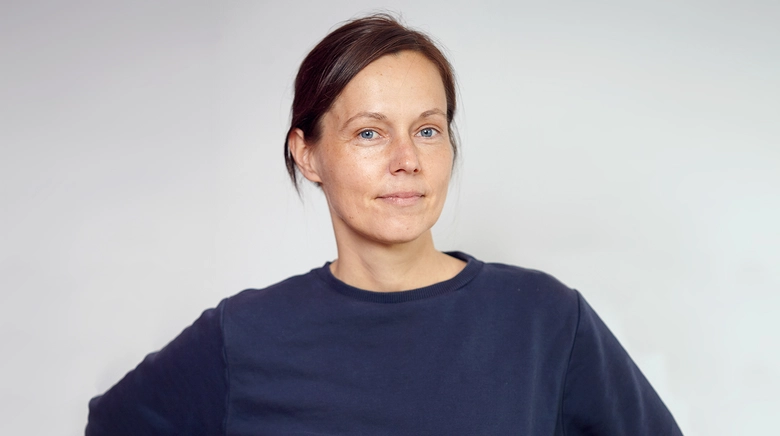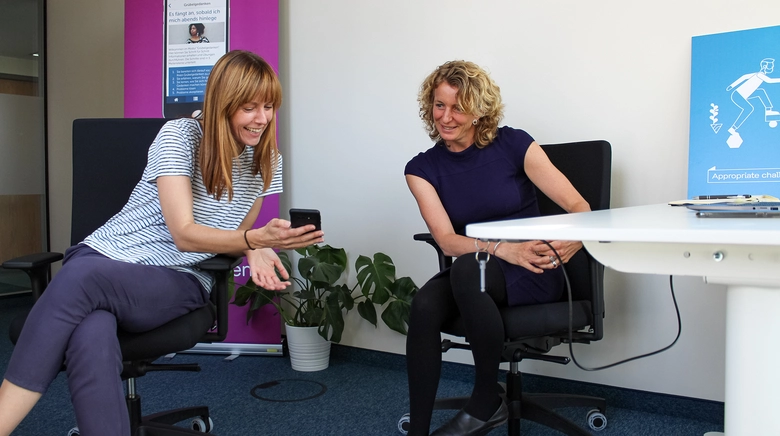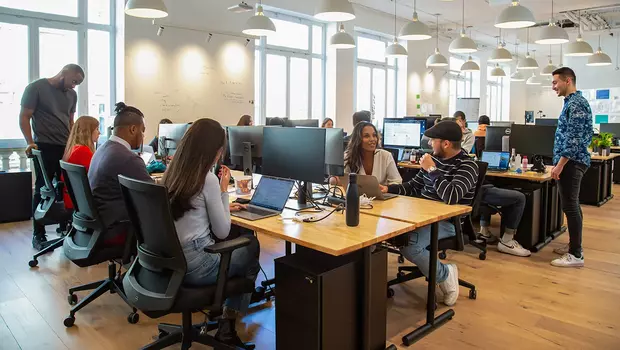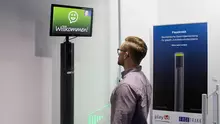Faster results, more success, greater appreciation – Dr. Manuela Schuetze talks about her career change from science to the economy

“Those who move in an academic environment often don’t know any better,” says Dr. Manuela Schuetze when we meet for an interview. She herself has had an outstanding scientific career and always thought that she would only find fulfilment in science – until one particular experience completely changed her views. Is a job in the private sector an option after all? Is it even possible that it could fulfil me more? Her thoughts turned into a new career path, the benefits of which she shares with us in this article.
Dr Manuela Schuetze is a neuroscientist and works as the Current Business DACH team leader at Minddistrict GmbH. Together with her team, she is expanding the field of psychotherapeutic treatments and implementing digital applications in hospitals, day clinics and outpatient clinics with the Minddistrict platform. Patients can use these around the clock to work on their recovery.
In her job she finally gets to be a scientist and a project manager at the same time. A path she has always wished for, that she greatly appreciates and has only found in the private sector. “Being able to help people directly is more meaningful to me than writing a paper and publishing it” explained Dr Manuela Schuetze.
At Minddistrict she focuses on empathic leadership, develops concepts and, hand in hand with the leaders of health institutions, finds new ways to put these concepts into practical use by patients. In doing so, she learns a lot of new things every day. Learning new things in the private sector? Yes, it’s possible and this is just one of the prejudices about having a job as a successful scientist in the private sector that she dispels in this interview.
How has your scientific career developed?
After my Bachelor’s degree in Linguistics at the University of Potsdam I moved to Osnabrück to complete my Master’s degree in Cognitive Science. I wrote my Master’s thesis through the University of Potsdam at the Max Planck Institute for Psycholinguistics in the Netherlands. I then worked there for another two years as a Research Assistant in the field of psycholinguistics. A great time. I was allowed to do research on many EEG and MRI studies. That was very interesting.
My time at the Institute sparked my interest in mental health and I started to become increasingly involved in the subject, especially speech disorders and autism. Then in 2014 I found a PhD position (scientific research doctorate) on the topic of “reward processing in children and adolescents with autism” in Canada and went to Canada. In total I was there for five years before I came back to Berlin in 2018. The conditions in my PhD were fabulous with a supervisor who supported me in everything, so even the birth of my daughter encouraged me to stay in science.
How did you then get a job in the economy?
I had already been looking for postdoc positions (post-doctoral jobs) in Berlin from Canada and conducted all job interviews via Zoom. I found what I was looking for and, together with my husband, decided on a temporary job at the German Institute of Human Nutrition, which included a joint project with the hospital Charité Berlin for me.
Unfortunately, this position was quite different from what I had hoped for. I found the environment very toxic and noticed that I felt increasingly uncomfortable in the science bubble. My daughter was two years old at the time and from the beginning it was important to me that work and family life could be easily combined. This is an aspect that science always emphasises but doesn’t actually make a reality. The science system is simply not designed to support young parents. That’s my experience at any rate.
For me, the situation became so unbearable that I decided to quit without any job prospects in sight. One thing I knew for sure: my career would not continue in science. So I registered as a jobseeker with the Federal Employment Agency and talked for the first time about the fact that I was interested in project management and would like to do further training. That would have been easily possible, but I was also sending out applications here and there at the same time.
On the day my further education course was due to start, I got an acceptance from one of these applications at glyconet Berlin Brandenburg – a network of scientists and entrepreneurs in glycobiology and glycobiotechnology in the capital region of Berlin-Brandenburg. This was “only” a parental leave replacement, but I was really looking forward to this new experience!
It was a great time. I blossomed so much and discovered so many talents in myself. Organisation, time management – I was allowed to organise whole conferences. It was a thoroughly positive experience with new tasks and challenges. I also learnt that appreciation can come regularly and not just be an exception for big results. I was overwhelmed and knew that I had arrived in the private sector. The only thing I missed in the long run was my passion: mental health. That was the reason that I kept looking around.

In your opinion, what makes a job change from science to the economy attractive?
A good company invests in its employees. It matters a lot how you are doing holistically, because companies don’t want to lose you if you do a good job. Science, on the other hand, is actually geared towards employees moving on. A PhD student doesn’t stay long, a Master’s student certainly doesn’t, and postdocs move on after about two years. But the labs have to sustain themselves throughout, so they build on a system with fluctuations.
I also experience more appreciation and support in the economy. The compatibility of family and work has been made possible for me. Through agile working, we achieve faster results as a team and thus also celebrate more successes than in science. Generally, in my team we look at who can best handle which tasks and distribute them accordingly. You know, if I can do 70 per cent of my tasks well and enjoy doing them, then the 30 per cent of the tasks that are not so good are also easier. In science, many people are constantly fighting their way through. This is not always good for your own mental health.
Also financially a job in the private sector is more attractive. And that is also part of appreciation. You also have more choice when it comes to jobs. In science, careers are often predetermined. The private sector offers more possibilities in terms of what you can do with your talents.
Why did you look for a job in Berlin?
It was important to me that my daughter would grow up with her family. I was born in Berlin and her grandparents live here. And my husband has always been a fan of Germany. He is from the UK, grew up in London and had already done his PhD here.
In an international comparison, Berlin offers a good social system, English is the second native language here, and the infrastructure is ideal for both private and professional life. My husband and I appreciate the Berlin nonchalance. You’ll find little etiquette here, the city is laid-back. After work, you just sit with a drink at your local bar instead of partying in expensive clubs. We like that. Berlin offers a good work-life balance.
What tip do you have for women with scientific careers who want to make a career in the economy?
Connect with other women! That’s the best thing you can do. It doesn’t always take an expensive mentoring programme. Use platforms like LinkedIn for networking and talk to other women about their career paths. That’s what I did.
I spent a lot of time on LinkedIn, looking at profiles and seeing who was based where professionally. If I found a woman and her career path interesting, I simply wrote to her and then asked my questions over a coffee, for example. This has even resulted in a WhatsApp group. We call this “Ladies’ Salon”. We meet every six weeks and exchange ideas about our jobs, families and careers. It’s very helpful.
My problem was simply that my whole sphere was in science. I had few other perspectives. Science is a bubble in which people often confirm to each other that there’s nothing better and that problematic hierarchies, uncertain perspectives and working at weekends are simply part of the deal. Connecting with women has broadened my perspective. I even found my current job via a LinkedIn post. A friend forwarded it to me.
Try it out and remember: The first job in the private sector doesn’t have to be the perfect job. Take the pressure off and gain experience. In job advertisements,look less at the job titles and more at the fields of activity. There you’ll find interesting parallels to your skills.
Furthermore, I can recommend the German Scholars Organization especially for female academics who come from abroad. The organisation accompanies you on your individual career path with support programmes and other offers. They talk openly with you about what you can do in the private sector as a scientist. You’ll be surprised at the options available to you. Have courage!





